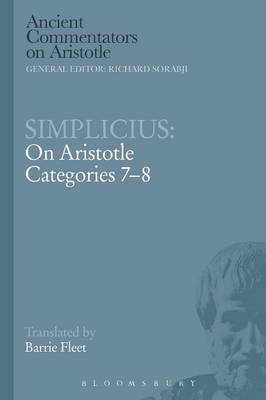
Simplicius: On Aristotle Categories 7-8
Seiten
2014
Bloomsbury Academic (Verlag)
978-1-4725-5734-6 (ISBN)
Bloomsbury Academic (Verlag)
978-1-4725-5734-6 (ISBN)
In "Categories" chapters 7 and 8 Aristotle considers his third and fourth categories - those of Relative and Quality. This text provides a translation of Simplicius' commentary on "Categories".
In Categories chapters 7 and 8 Aristotle considers his third and fourth categories - those of Relative and Quality. Critics of Aristotle had suggested for each of the non-substance categories that they could really be reduced to relatives, so it is important how the category of Relative is defined. Aristotle offers two definitions, and the second, stricter, one is often cited by his defenders in order to rule out objections. The second definition of relative involves the idea of something changing its relationship through a change undergone by its correlate, not by itself. There were disagreements as to whether this was genuine change, and Plotinus discussed whether relatives exist only in the mind, without being real. The terms used by Aristotle for such relationships was 'being disposed relatively to something', a term later borrowed by the Stoics for their fourth category, and perhaps originating in Plato's Academy. In his discussion of Quality, Aristotle reports a debate on whether justice admits of degrees, or whether only the possession of justice does so. Simplicius reports the further development of this controversy in terms of whether justice admits a range or latitude (platos). This debate helped to inspire the medieval idea of latitude of forms, which goes back much further than is commonly recognised - at least to Plato and Aristotle.
In Categories chapters 7 and 8 Aristotle considers his third and fourth categories - those of Relative and Quality. Critics of Aristotle had suggested for each of the non-substance categories that they could really be reduced to relatives, so it is important how the category of Relative is defined. Aristotle offers two definitions, and the second, stricter, one is often cited by his defenders in order to rule out objections. The second definition of relative involves the idea of something changing its relationship through a change undergone by its correlate, not by itself. There were disagreements as to whether this was genuine change, and Plotinus discussed whether relatives exist only in the mind, without being real. The terms used by Aristotle for such relationships was 'being disposed relatively to something', a term later borrowed by the Stoics for their fourth category, and perhaps originating in Plato's Academy. In his discussion of Quality, Aristotle reports a debate on whether justice admits of degrees, or whether only the possession of justice does so. Simplicius reports the further development of this controversy in terms of whether justice admits a range or latitude (platos). This debate helped to inspire the medieval idea of latitude of forms, which goes back much further than is commonly recognised - at least to Plato and Aristotle.
Barrie Fleet is Preceptor and Director of Studies in Classics at Corpus Christi College, Cambridge, UK.
Abbreviations
Preface by Richard Sorabji
Introduction
Textual Emendations
Translation
Notes
Bibliography
Appendix: The Commentators
English-Greek Glossary
Greek-English Index
General Index
Index of Passages Cited
| Erscheint lt. Verlag | 10.4.2014 |
|---|---|
| Reihe/Serie | Ancient Commentators on Aristotle |
| Verlagsort | London |
| Sprache | englisch |
| Maße | 156 x 234 mm |
| Gewicht | 345 g |
| Themenwelt | Geisteswissenschaften ► Philosophie ► Logik |
| Geisteswissenschaften ► Philosophie ► Philosophie Altertum / Antike | |
| ISBN-10 | 1-4725-5734-4 / 1472557344 |
| ISBN-13 | 978-1-4725-5734-6 / 9781472557346 |
| Zustand | Neuware |
| Haben Sie eine Frage zum Produkt? |
Mehr entdecken
aus dem Bereich
aus dem Bereich
ein Gegenentwurf zum kurzfristigen Denken : so werden wir zu den …
Buch | Hardcover (2023)
REDLINE (Verlag)
CHF 27,90


